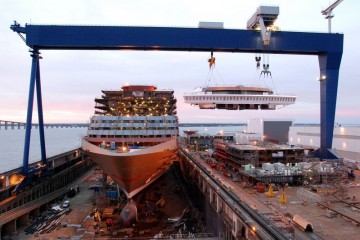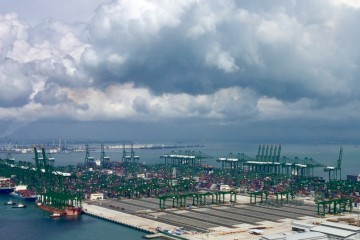2017 will be a special year, in case you have not noticed. Each day brings the news of new political surprises that could potentially disrupt the global world order. If the last month is any indicator, 2017 promises to be the year in which everything needs to be reconsidered and nothing can be taken for granted. It could be a year of destruction; the challenge is to make this a creative destruction. By some lucky coincidence, 2017 is also the EU maritime year. Will Europeans use the opportunity to rethink maritime transport and build up a more appropriate maritime transport system? A first indication will come next week, during the European shipping week.
That would be surprising. The instinct of the shipping sector is to play defensive, mostly because they have too much to lose: subsidies, favourable tax regimes, the freedom to accumulate bargaining power and easy avenues to avoid regulation. All accommodated by a Commission that seems to focus on buzzwords. If changes would be proposed, it might simply be to make sure that things stay as they are.
The main lesson of the past month is that Europe is probably on its own. It has – for the moment (and nobody knows how long this moment will last) – lost the unconditional support of the US. EU better be aware: there are potential adversaries that do not share the same values and that are better prepared to use maritime trade geopolitically. Being on your own means being able to secure vital supplies, be it energy sources, food or something else. Maybe there is a secret plan on Europe’s vital supplies that I am not aware of, but if there is I am pretty sure it is not translated into maritime transport policy. Securing these supplies via maritime transport would mean: disposing of ships, routes and ports.
Ships
I say ships, not shipping firms. The US has a relatively modest shipping sector, not one of the large flags, yet it has secured a strategic emergency supply of ships via arrangements with friendly flags (Panama, Liberia, Marshall Islands), in most cases administered by Americans and from the US. If the aim is to have a strategic supply of ships when needed and European seafarers to operate this, one could wonder if the current European policy of massive state aid is really the best value for money. Research would be needed to answer that question, but my assumption is that Europe could do much better. The current regime is very undifferentiated: state aid can cover all shipping sectors and is hardly dependent on the nationality of seafarers. So in most cases taxpayers money is used to support shipping firms that employ non-Europeans with vessels that are not strategic to Europe’s survival. Can we please reconsider this generic support for the sector? Some discussions have started (e.g. in France) on defining what are strategic shipping sectors, but the challenge is to be really focused. If everything is strategic, nothing is strategic. We do not need the change that allows things to remain exactly the same. What are the alternative measures to have a strategic supply of ships? If we want to have EU seafarers, why not have a specific labour cost reduction subsidy for EU seafarers rather than an undifferentiated lump sum?
Routes
Look at the world map and you will see that major maritime chokepoints and routes are increasingly controlled by China: it has masterly defined its preferred belts and roads, “owns” crucial global transport corridors, strategic assets and has even managed to set up an alternative to the World Bank to finance all this. Is it not time for a European equivalent? And no, TEN-T is not the answer; it is the metro map to be used when arriving to Europe, but in times of war you would not want essential goods to be stuck elsewhere in the world. So what are the key locations in the world where European control is needed and how to deploy all sorts of instruments to secure key routes. Europe does not have – like China – state-owned companies that invest in strategic ports elsewhere in the port, yet it has many other vehicles that should be deployed more to secure maritime routes: development banks, technical assistance, diplomacy, association agreements. Use these strategically.
Ports
These are the real strategic assets, but the EU does not seem to have discovered this yet. An illustration of this ignorance is the case of the port of Piraeus that Greece sold to the Chinese state, under heavy pressure of the EU. European taxpayer money is now used to connect this piece of Chinese property to the main European consumption basins. Could the EU maritime year at least serve to acknowledge this a practice of the past? Why would European ports or terminals be open to majority stakes of China, but Chinese ports not open to majority stakes of European terminal operators? Where is the geopolitical reciprocity? Another suggestion: stop bothering ports with poorly picked fights: on competition in port services, port labour and tax exemptions. Support ports getting stronger and focus on the real issues, such as the unbalance between shipping companies and ports. Reconsider the odd practice to strengthen the (private) shipping sector but fragment the (public) ports sector. What is the logic of favouring tax exemptions for shipping but not for ports; of stimulating competition between ports/terminals but allowing concentration of shipping lines; of strengthening the bargaining position of shipping that reduces the return on investment in European ports?
Values
Ronald Reagan famously spoke of the US as the shining city upon a hill. Trump seems to believe in the moral equivalence of the world’s large powers. The US is no longer the leader of the free world, that position is vacant for Europe to grasp. Also in maritime transport, Europe can be an inspiring example to the world. It can show that it cares about citizens, workers and legacy. It can move faster on shipping emissions, ship recycling and all other subjects where global consensus often equates with slow and lowest common denominator. Accept that regional solutions are fine; it is Europe that will set pace and standard.



